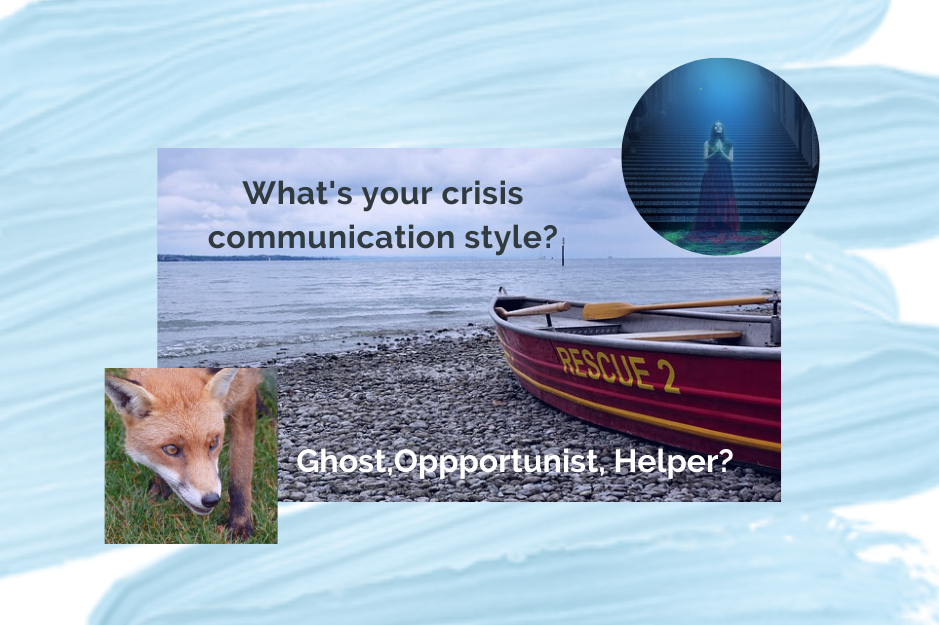
In times of upheaval, change and turmoil, there are three categories of business communication. Businesses become ghosts, opportunists or helpers. Once the crisis is over, only one of those groups comes out stronger, with client relationships enhanced, and poised to expand and grow. Here we look at three crisis communication styles and which will always come out on top.
Ghosts
When the world is turned upside down, and businesses face uncertainty and doubt, they can be tempted to retreat into their shell. The option of shutting the world out, cutting off contact and contemplating your navel can seem oh so very appealing. Businesses can be so busy worrying about how the crisis is affecting them that they forget all about their customers, and reminding them how they can help them navigate the new reality. Some think they’ll simply ‘sit it out’ and wait for things to recover. They put communication with the outside world on hold and become purely inward focussed. Business communication pretty much comes to a halt.
They become communication ‘ghosts’. A business that is not communicating with its audience is hard to see, not really there, just an ephemeral shadow.
Customers may think the business has shut down altogether. Others might assume the business isn’t the expert they had thought and has nothing to offer them. Or that they simply don’t care about their customers. Many clients will move on, and find someone who is visible, and showing the way through the crisis.
Of course, some businesses have no option at the moment but to shut their physical premises temporarily, but that doesn’t mean that business communication has to stop. Like the Melbourne gym that told members they could hire the equipment for home use, provides daily workout videos online and keeps the community connected on its Facebook page.
Ghosts come out of a period of non-communication to find that the world has moved on without them and they’ve got a lot of catching up to do.
Opportunists
We’ve all seen them – the businesses who react to a crisis with the digital equivalent of an airborne propaganda drop. They scattergun material across social media, newsletters, emails – every conceivable form of communication. It may be well-intentioned, but like those airborne drops, it is not targeted and rather hit and miss. Opportunists are more concerned with taking an opportunity to promote their brand than offering genuinely useful advice. That’s not to say that ‘feel good’ or ‘we care about our customer’ messages are not appropriate some of the time especially at the start of a crisis. But, unless they are backed up pretty quickly with something more practical, they fall into the opportunist camp.
The problem with the opportunist approach is that whilst it might look appealing initially, without substance it soon becomes irrelevant. This is particularly true as business moves into the second and third waves of a new world order. Opportunists’ business communication is ultimately shallow, and it doesn’t take the market too long to work that out.
Opportunists can find themselves having spent time, effort and money on business communication that looks wonderful but provides no deep or long term value.
Helpers
Businesses exist to help their customers. They will often have invaluable industry insights about how to address issues. Or have ideas and suggestions about how their customers’ business can adapt and do things differently. They may have adapted in order to serve their customers better and to help them through a crisis. Perhaps they have a new process, product, delivery method, or service that will help their customers’ through difficult times.
Customers value all of these insights, innovations and ideas. Helpers are businesses that continue to communicate through a crisis, and share this intellectual capital. They are generous with their knowledge and help. That doesn’t mean they necessarily offer everything free of charge, but it does mean that they offer help.
Times of crisis can be hard for helpers. Even though they are sharing value, the abundance of messaging from the opportunists can flood business communication channels. Helpers can therefore find it hard to be heard. They have to be 100% clear and focussed with their message, to ensure it stands out above the noise.
The great news for helpers is that during, and after, the crisis, their customers value them even more. They have taken a leadership position, shared their expertise, shown understanding and generosity. They are the ones that come out of a time of upheaval with their reputation and customer base not only intact, but enhanced.
Be a helper
So, avoid the temptation to retreat. Don’t hit send on a message that is more about you than your customer. Think about what your customers value from you, make the message clear and focussed and then COMMUNICATE!
